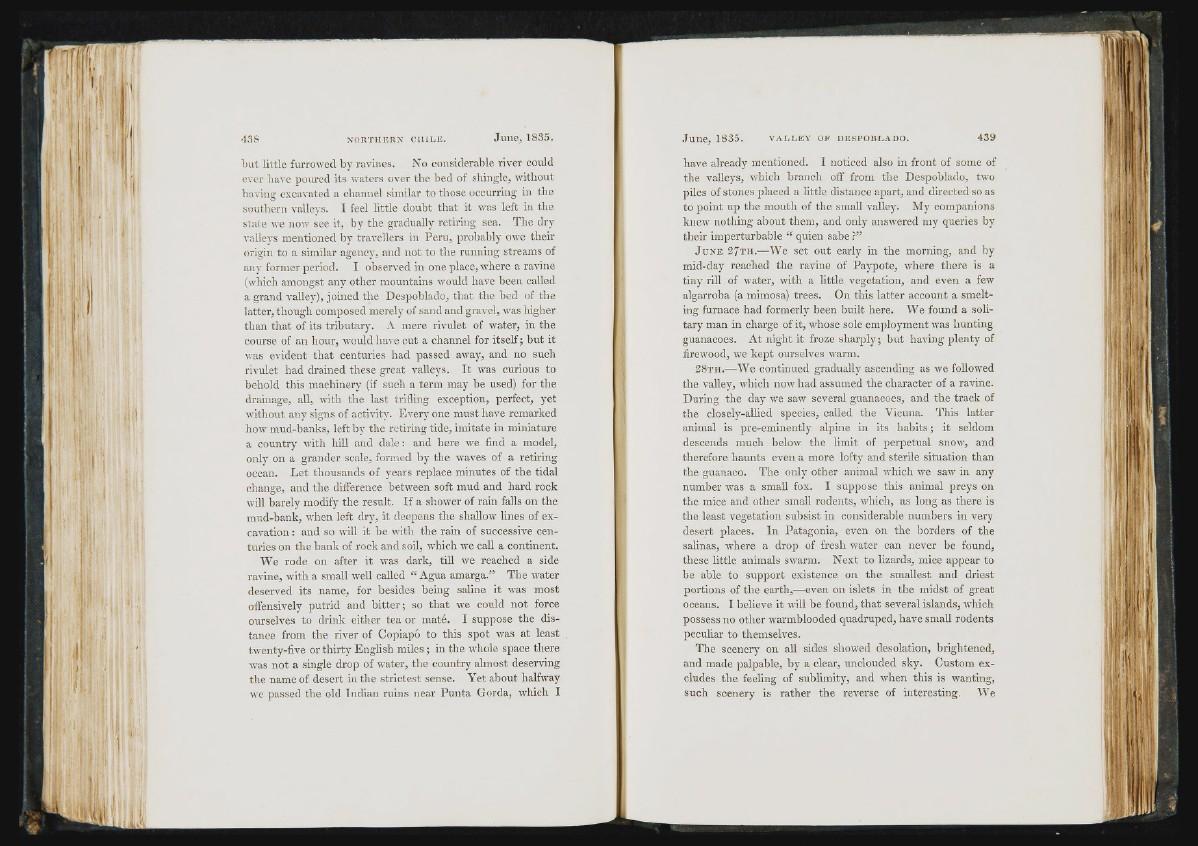
= !
I
>! I |.T ,
I '
‘ft ■
l i e ! "
but little furrowed by ravines. No considerable river could
ever have poured its waters over the bed of shingle, without
having excavated a channel similar to those occurring in the
southern valleys. I feel little doubt that it was left in the
state we now see it, by the gradually retiring sea. The dry
valleys mentioned by travellers in Peru, probably owe their
origin to a similar agency, and not to the running streams of
any former period. I observed in one place, where a ravine
(which amongst any other mountains would have been called
a grand valley), joined the Despoblado, that the bed of the
latter, though composed merely of sand and gravel, was higher
than that of its tributary. A mere rivulet of water, in the
course of an hour, would have cut a channel for itself; but it
was evident that centuries had passed away, and no such
rivulet had drained these great valleys. It was curious to
behold this machinery (if such a term may be used) for the
drainage, all, with the last trifling exception, perfect, yet
without any signs of activity. Every one must have remarked
how mud-banks, left by the retiring tide, imitate in miniature
a country with hill and dale; and here we find a model,
only on a grander scale, formed by the waves of a retiring
ocean. Let thousands of years replace minutes of the tidal
change, and the difference between soft mud and hard rock
will barely modify the result. If a shower of rain falls on the
mud-bank, when left dry, it deepens the shallow lines of excavation
: and so will it be with the rain of successive centuries
on the bank of rock and soil, which we call a continent.
We rode on after it was dark, till we reached a side
ravine, with a small well called “ Agua amarga.” The water
deserved its name, for besides being saline it was most
offensively putrid and bitter; so that we could not force
ourselves to drink either tea or maté. I suppose the distance
from the river of Copiapo to this spot was at least
twenty-five or thirty English miles; in the whole space there
was not a single drop of water, the country almost deserving
the name of desert in the strictest sense. Yet about halfway
we passed the old Indian ruins near Punta Gorda, which I
have already mentioned. I noticed also in front of some of
the valleys, which branch off from the Despoljlado, two
piles of stones placed a little distance apart, and directed so as
to point up the mouth of the small valley. My companions
knew nothing about them, and only answered my queries by
their imperturbable “ quien sabe ?”
J u n e 2 7 t h .—We set out early in the morning, and by
mid-day reached the ravine of Paypote, where there is a
tiny rill of water, with a little vegetation, and even a few
algarrolja (a mimosa) trees. On this latter account a smelting
furnace had formerly been built here. We found a solitary
man in charge of it, whose sole employment was hunting
guanacoes. At night it froze sharply; but having plenty of
firewood, we kept ourselves warm.
2 8 t h .—We continued gradually ascending as we followed
the valley, which now had assumed the character of a ravine.
During the day we saw several guanacoes, and the track of
the closely-allied species, called the Vicuna. This latter
animal is pre-eminently alpine in its habits; it seldom
descends much below the limit of perpetual snow, and
therefore haunts even a more lofty and sterile situation than
the guanaco. The only other animal which we saw in any
number was a small fox. I suppose this animal preys on
the mice and other small rodents, which, as long as there is
the least vegetation subsist in considerable numbers in very
desert places. In Patagonia, even on the borders of the
salinas, where a drop of fresh water can never be found,
these little animals swarm. Next to lizards, mice appear to
be able to support existence on the smallest and driest
portions of the earth,—even on islets in the midst of great
oceans. I believe it will be found, that several islands, which
possess no other warmblooded quadruped, have small rodents
peculiar to themselves.
The scenery on all sides showed desolation, brightened,
and made palpable, by a clear, unclouded sky. Custom excludes
the feeling of sublimity, and when this is wanting,
such scenery is rather the reverse of interesting. We
H